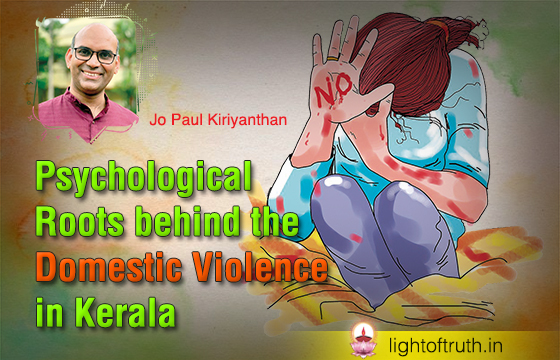While Kerala’s performance in education, healthcare, and social indices is sound, domestic violence remains a burning and increasing issue in the state. According to Mathrubhumi, Mithra 181 women’s helpline received 10,898 calls on domestic abuse during the year 2021, almost two times more than in 2019. In Ernakulam, The Hindu reported that Snehitha gender help desk settled more than 2,000 domestic violence cases, showing an upward trend consistently. In rural Thiruvananthapuram, 26–27% of married women employed in unskilled manual occupations reported abuse—physical, emotional, and sexual—as a study in the International Journal of Community Medicine and Public Health revealed.
While Kerala’s performance in education, healthcare, and social indices is sound, domestic violence remains a burning and increasing issue in the state.
Its causes are both structural and psychological.
A report in Mathrubhumi based on the National Family Health Survey reported 69% of housewives in Kerala support a husband punishing his wife in cases of disobedience.
Under-reporting is still a big issue.
Kerala’s domestic violence crisis is a result of a complex combination of cultural values, economic stress, psychological weakness, and poor support systems.
It needs to be dealt with not just by legal enforcement but also by public awareness, improved mental health services, economic empowerment of women, and easier access to support systems.
Its causes are both structural and psychological. Alcoholism, which is commonly referred to as a primary catalyst, disrupts emotional control and enhances stressful behaviour. In a study conducted by SAGE Journals, husband substance abuse is a regular factor in domestic violence cases. Economic hardship is also a primary factor. The Hindu writes that failed dowry expectations and financial troubles often fuel tensions at home. Deep-seated psycho-social assumptions are another driving factor. A report in Mathrubhumi based on the National Family Health Survey reported 69% of housewives in Kerala support a husband punishing his wife in cases of disobedience. Such internalized assumptions of the right to punish legitimize abuse and deter victims from seeking assistance. Family background and mental well-being are also factors. Research indicates that disaffection from in-laws, communication failure, and marital unhappiness can heighten tension and result in violence. In other instances, untreated conditions such as emotional instability or personality disorders among the couples further intensify the problem, as noted by Inter Press Service.
Under-reporting is still a big issue. EPRA Journals state that fear of stigma, financial reliance, and lack of legal knowledge deter many women from reporting. Official figures thus probably do not reflect the true extent of the problem. The COVID-19 pandemic aggravated the situation. A study in the International Journal of Indian Psychology noted that lockdowns, loss of employment, and extended confinement intensified both abuse and stress, and decreased access to support services. Kerala’s domestic violence crisis is a result of a complex combination of cultural values, economic stress, psychological weakness, and poor support systems. It needs to be dealt with not just by legal enforcement but also by public awareness, improved mental health services, economic empowerment of women, and easier access to support systems. Only an integrated approach can ensure lasting reformed.


